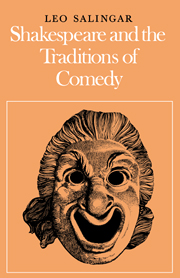4 - Fortune in classical comedy
Published online by Cambridge University Press: 04 December 2009
Summary
I well consider all that ye have sayd,
And find that all things stedfastnes doe hate
And changed be: yet being rightly wayd
They are not changed from their first estate.
SpenserThis is a matter of no small importance to me. I insist on knowing where you deposited the hand-bag that contained that infant.
The Importance of Being EarnestErrors prompted by unreason, by vanity, by double meanings, by guile – all these types of ‘deceit’ listed by Castelvetro can be traced back to Old Comedy. But so far in this discussion of the legacy of classical comedy to the Renaissance there has been no occasion, except in passing, to mention Castelvetro's remaining sub-category, of deceptions caused by chance or fortune. In the main, this important motif was introduced by New Comedy, where it marks one of the main departures from the comic scheme of Aristophanes. But its origins go back earlier.
THE WHEEL OF FORTUNE
In its synonyms and associations, down to the present, the idea of ‘fortune’ touches a wide span of meanings: haphazard, chance, accident, coincidence, luck, wealth, the unpredictable, adversity, the force of circumstance, even fate. The primary scope of meaning of tyche, fortune, in Greek has been explained as the way things ‘hit’ or turn out, where there is no evident reason; and the connotations of the word were neutral or favourable at first. It stood for a vaguely personified minor deity or daemon, a subordinate nature-spirit.
- Type
- Chapter
- Information
- Shakespeare and the Traditions of Comedy , pp. 129 - 174Publisher: Cambridge University PressPrint publication year: 1974



